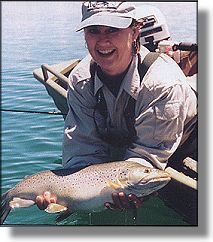
Australia, World Fly Fishing Championships
Text and Photos by John Huff
Australia's tourist town of Jindabyne in the Snowy Mountains was
host for the 19th World Fly Fishing Championships. From November
27th to December 4, 1999, 20 teams from around the world, including
Canada, gathered to fish the competition waters of Lake Jindabyne,
Lake Eucumbene and the Murrumbidgee River. The event involved
five sessions: two in a drifting boat (with or without drogue) on each
of the lakes, two fishing a shore beat on each of the lakes, and one
fishing a beat on the river. Five groups of 20 anglers (one from each
country) rotated through each of the venues over three days. Barbless
hooks and catch-and-immediate-release were mandatory.
Brown and rainbow trout were the primary target species along with
brookies and Atlantic salmon. We arrived in Jindabyne a week in
advance to get acclimatised and to research the best techniques and
flies. Phil Buttress, a guide in his early sixties, was our source for
local knowledge. He had fished these waters for many years and
was an inspiration for all of us.
The conditions were tough. It had been a late spring and the region
was suffering from the effects of a four-year drought. Consequently,
the water in the lakes (dam-controlled reservoirs) was dreadfully low.
Temperatures were in the high 30's, with little or no wind under brilliant
skies. To make matters worse, competition started at 9:30AM and
ended at 7:00PM - not prime time in such conditions. Midges were
the main hatch, along with sporadic beetles and the occasional caddis.
Team Canada in Action!
Fly Fishing Team Canada had a great first day, even though only two
of our five anglers caught fish. After two sessions we were in third place
behind Australia and Spain, and Kathy Ruddick of Vancouver had
shocked the otherwise all-male field by winning overall in the first
session. I had the pleasure of discussing tactics with Kathy and
watching as she systematically worked her way upstream on the
Murrumbidgee, taking fish on dry fly and nymph, then finally using
her Cortland ghost tip to take a couple more from the deeper pools.
She followed up by placing second on Lake Eucumbene. From a
drifting boat she enticed one fish on a fast sinking line in a session
where 18 of the 20 anglers caught nothing. She ended the day in
second place behind Australia's Ross Stewart.
Donald Thom of Chelsea, Quebec won his first session on Lake
Eucumbene with two fish within minutes of each other to put him
in third place overall. There were 17 blanks in his session.
The rest of our anglers, David Bishop from Grand Cascapedia (Quebec),
Dale Freschi from Medicine Hat (Alberta), and Randy Taylor from
Kanata (Ontario) were all fishless in both sessions that first day. But
they were not alone, for well over half the field had blanked the day
as well.
On day two, things began to fall apart for us. Dale Freschi was our
only angler to take a fish. After exhausting the possibilities in the main
pool of his beat on the Murrumbidgee, we decided to try the pocket
pools in the faster water with a Red Tag. A scoring rainbow rose
to the offering.
By the final day with just one session to go, we'd dropped to sixth
place and Kathy to seventh individually. However, blanks were so
prevalent and the scores so close, we knew that if we could entice a
few fish, there was a good chance of elbowing our way to the top.

In fact, going into that final session, Kathy had a legitimate shot at
being Canada's first angler ever to make it to the podium in a World
Fly Fishing Championship. In seventh place after four sessions,
Kathy needed only one fish, along with a few blanks from the six
anglers in front of her, to put her into the medals. The blanks were
a sure thing - the score sheets had been riddled with them. It was
hooking that one fish casting from her shore beat on Lake Eucombene
that would be the tough part.
I drove up to the shores of Lake Eucumbene to meet Kathy before her
final session of shore fishing. The weather had changed - strong winds
were gusting out of the east. But luckily her beat was somewhat protected
by a rocky point, and as start time approached, we had managed to
identify food items that had washed ashore, locate the wind-driven
food lanes, and develop a strategy. Unfortunately, by then the wind
had intensified and shifted directly onshore, churning up silt and severely
restricting casting. Prospects didn't look good as I headed off to find
David Bishop on the river.
David had so far gone fishless, and the beat he had drawn on the
Murribidgee had produced blanks for everybody who'd fished it.
But, as a river specialist, he was determined.
By the time I got there he had already spotted some fish, had a rise
from one, and hooked and lost another. Earlier I'd met a local landowner,
who had mentioned that she often saw fish rising in the evening in the
deep pool at the bottom of David's beat. When David asked me for
fly selection to approach this water, I immediately suggested a
Woolly Bugger, knowing it was the fly he fished most confidently.
Casting down and across with only minutes to go, he connected
with a 37 cm Brown, that tested him with strong runs and several
jumps before he brought it to the net for measurement and release.
David was the only team member to get a fish on that final session,
but it was enough to keep us in the top ten. We finished in eighth
place overall, and Kathy grabbed tenth individual place - Canada's
best ever. (I was 11th in New Zealand in '91.)
Australia was the overall champion followed by France and New
Zealand. For us, though, it was a bit disappointing after such a
promising start. But the scores (see chart) were very close and
we did secure North American bragging rights, as the U.S. team
finished in 17th place.

Despite the poor conditions at the time of the competition ("Shoulda
been here last year, mate"), the Snowy Mountain region does offer
some great angling opportunities - from casting to big browns
cruising the lakeshores, to exploring mountain streams, such as
the Thredbo, with nymphs and dries.
Final Team Standings - (twenty teams)
|
| Country |
Total Fish |
Placing Points
(low scores best) |
| 1. Australia |
14 |
309 |
| 2. France |
12 |
352 |
| 3. New Zealand |
10 |
376 |
| 4. Spain |
9 |
385 |
| 5. England |
7 |
395 |
| 6. Slovakia |
8 |
401 |
| 7. Poland |
6 |
415 |
| 8. Canada |
9 |
416 |
Next time more on the World Championships in 2000. ~ John Huff
|





